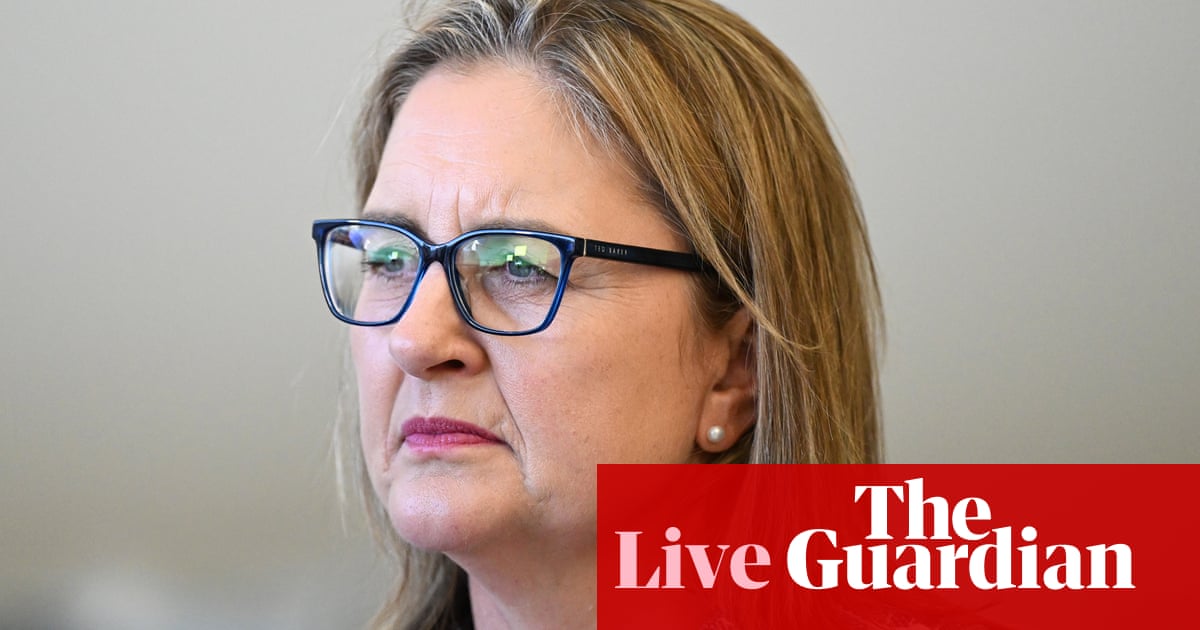Jacinta Allan plans to mark iftar with ‘private occasions’ following cancellation of annual dinner

Benita Kolovos
As Amy reported earlier, the Victorian government has cancelled its annual iftar dinner after the state’s peak body for Muslims and other community groups announced they would not attend the event given Labor’s stance on the conflict.
Speaking in Ballarat on Thursday, premier Jacinta Allan said:
We consulted across a range of leaders across the Islamic community and considered how the event could be held in a considerate way and respectful way and certainly not in a celebratory way given the distress and grief we all see coming out of the conflict in the Middle East.
My role here in Victoria is to support the community, not add to distress and grief. It’s in that context that the dinner will not be proceeding this year. It is my intent to mark iftar, to mark events through the Ramadan period, respectfully with private occasions, sitting with families [and] providing support and care.
I do not want to add any moment of additional stress and distress to people who are already deeply grieving. It was in that context that we’ve made what is a difficult decision.
Key events
Question time begins
The final question time is about to get underway.
Milton Dick will let us know when a byelection in Cook will be held.
Peter Dutton kicks off with a bipartisan dixer on the strategic relationship between Australia and the Philippines.
Prime Minister, today we were honoured to host the President of the Philippines in this very chamber. He’s here as part of the Asean [meeting] in Melbourne next week. Would the prime minister advise of the significance of the summit to commemorate the 50th anniversary of the Australia Asean dialogue partnership between Australia and Asean?
Everyone is feeling very bipartisan.

Paul Karp
Alex Turnbull believes he may have been targeted by espionage attempt
Alex Turnbull, the son of former prime minister Malcolm Turnbull, is quoted in news.com.au saying that he believes he may have been the target of an approach referred to by spy chief Mike Burgess.
He reportedly said he expressed no interest and forwarded the details immediately to the authorities.
Alex Turnbull told Guardian Australia:
Inoculation is cheap and good. Not everyone is going to be as attuned to the risks. If you spend your whole life in Australia, this stuff is pretty foreign and not something you normally have to think about. Asio needs to sit people down for a half day of training.
Question Time looms …
Would you look at that – it is almost time for the last question time of this sitting session.
Which does not bode well for any of us, given it is the last one before Saturday’s Dunkley byelection.

Rafqa Touma
Pro-Palestinian students rally outside UTS before protest march towards Town Hall
Students are starting to gather outside the University of Technology Sydney, ahead of a march to Town Hall calling for a ceasefire for Gaza – part of a national day of student action striking for Palestine.
Protesters from University of Sydney have marched up to the University of Technology Sydney campus to join the student march for Palestine to Town Hall pic.twitter.com/UhmuPELp6n
— Rafqa Touma (@At_Raf_) February 29, 2024
Yasmine Johnson, a UTS student and organiser for Students for Palestine, said:
Students are not going to sit quietly in schools while the government gets away with supporting Israel.
I think a lot of people are really angry … The fact that [the Australian government] spent months saying Israel has the right to defend itself, and then [students are] watching on their phones the videos of children who are starving in Gaza.
Protesters from the University of Sydney have joined forces with protestors outside the University of Technology Sydney as the students begin their march for Palestine to Town Hall.
Australia Council for International Development urges government to reinstate Unrwa funding
The Australian Council for International Development (ACFID) is busy today on top of releasing its pre-budget submission, it is also urging the federal government to reinstate funding for the United Nations Relief and Works Agency (Unrwa) so the agency can pay workers delivering lifesaving aid.
The federal government has suspended $6m in funding it announced earlier this year, following allegations from Israel Unrwa staff were involved in the 7 October attack. Penny Wong has since admitted the government did not have “all the facts” before making the decision to pause the additional aid, but were waiting on the outcome of an Unrwa investigation.
ACFID’s CEO, Marc Purcell, said the UN aid agency would be unable to continue any operations in Gaza in a matter of weeks if it did not receive an injection of funds.
Unrwa is the backbone of the humanitarian response in Gaza.
The time for Australia to show leadership on the international stage by reinstating funding is now, so that other donors can see that the Australian government has confidence in Unrwa’s response.
The humanitarian catastrophe we are seeing in Gaza is on the brink of collapse, with a possible invasion of Rafah putting further strain on the little capacity that Unrwa has left.
ACFID is calling on the Australian government to prioritize the humanitarian need in Gaza, recognize UNRWA’s commitment to neutrality and immediately reinstate its $6m aid package. It is the right thing to do.
Aid convoys which have been allowed through border crossings into Gaza and the West Bank have come under constant fire from Israeli troops, preventing assistance from reaching where it is needed.
No questions at Albanese-Marcos press conference
To cover off some earlier business for those wondering – there were no questions allowed at the joint Albanese-Marcos Jr press conference.
Kate Chaney backs Gee bill, but motion on housing debate set to fail
The independent MP Kate Chaney is backing the suspension of standing orders motion (not that it matters because the government holds the numbers and is against it).
She says housing affordability is raised every time she speaks to constituents and while she had originally had concerns the Gee bill was xenophobic and she supports immigration, she sees it as a temporary measure to reduce demand.
Chaney rebuts Julie Collins’ assertion that allowing foreign investors to build new homes boosts supply by pointing out it takes land, resources and tradies away from Australians attempting to do the same thing at the moment, and the property is not necessarily put on the market as additional stock.
The house is dividing, but it is a formality – with the government against it, the motion will fail.
Labor indicates it will not support housing debate or Gee bill at this time
Housing minister Julie Collins says the government won’t be supporting the motion to suspend standing orders but appreciates Andrew Gee’s passion.
The government also doesn’t support the bill. Collins says it is only in very rare circumstances that foreign investors can buy an existing property and their investment in new stock boosts supply.
Katter asks what opposition and government have done for housing affordability
Bob Katter is speaking on the motion to suspend standing orders.
He wants to know what the opposition has said or done or put forward to address housing affordability.
He says the government is increasing demand with things like help to buy, but that doesn’t actually help people get into homes. He supports Andrew Gee’s bill as he says it is “something that would lower demand”.
For the bill to be brought on, the government would have to agree to change its order of business –and for the bill to pass, the government would have to support it.
Andrew Gee introduces private bill to ban foreign investors from buying houses
Andrew Gee has a private members bill he wants the government to bring on for debate (it was mentioned at the end of his motion there) which was modelled on Canadian legislation.
It would ban foreign investors from being able to purchase housing in Australia for two years.
Gee introduced it earlier this month and wants it brought on as a matter of urgency.
Andrew Gee calls for ‘urgent action’ to address the housing affordability crisis
The House of Representatives sitting has resumed and independent MP Andrew Gee has kicked things off by moving to suspend standing orders to discuss the housing affordability crisis:
Gee wants the house to note:
The housing affordability crisis is having a devastating impact on many Australians, particularly first home buyers and young families.
Urgent action is required to prevent the great Australian dream of home ownership from slipping away from many Australians.
The National Australia Bank residential property survey for fourth quarter 2023 found that the market share of foreign buyers in new Australian housing markets grew for the fifth straight quarter to a six and a half year high of 11%. In New South Wales foreign buyers had a 15% market share.
A two-year prohibition on the foreign purchase of residential property in Australia would ensure that the interests of foreign property speculators are not being prioritised over the interests of Australian first home buyers and young families.
That private members’ business order of the day No. 27, relating to the prohibition on the purchase of residential property by foreign entities Bill 2024, be called on immediately and be given priority over all other business for final determination of the House.
The Australian Council for International Development argues case to increase foreign aid spend
For those who don’t follow the parliamentary calendar as religiously as we do (and more power to you) it is pre-budget submission season, which is when interest and lobby groups put in their wish list to treasury about what they would like to see the budget contain.
The Australian Council for International Development CEO, Marc Purcell, wants to see an increased focus on the foreign aid spend.
In particular, Purcell and the council want to see “the following measures to meet Australia’s commitment to boosting official development assistance to the OECD average of 0.37% of gross national income by the end of 2027”:
-
$150m to double Australia’s Humanitarian Emergency Fund contribution;
-
$350m towards meeting Australia’s fair share on humanitarian funding;
-
$100m as an initial pledge for the global loss and damage fund for developing nations;
-
$40m to expand locally-led climate adaptation programs;
-
$50m for NGO-led impact investment funds;
-
$60m to safeguard civic space and strengthen civil society;
-
$35m for Australia’s NGO Cooperation Program; and
-
$63.3m towards achieving LGBTQ+ rights, gender equality and disability equity in Australia’s development program
Purcell said:
The foreign aid budget is at an all-time low as a proportion of overall government spending. Without a substantial boost, this is set to flatline from 2026 even as global demand for humanitarian and development assistance soars.
Australia is one of the least generous OECD aid donors, coming 28th place out of 31 nations. It is also at the back of the pack of foreign aid spending among G7 economies, Aukus and Five Eyes partners.
Failing to invest in foreign aid risks undermining Australia’s relationships with our neighbours, and its position as a trusted and respected regional partner.
Jacinta Allan plans to mark iftar with ‘private occasions’ following cancellation of annual dinner

Benita Kolovos
As Amy reported earlier, the Victorian government has cancelled its annual iftar dinner after the state’s peak body for Muslims and other community groups announced they would not attend the event given Labor’s stance on the conflict.
Speaking in Ballarat on Thursday, premier Jacinta Allan said:
We consulted across a range of leaders across the Islamic community and considered how the event could be held in a considerate way and respectful way and certainly not in a celebratory way given the distress and grief we all see coming out of the conflict in the Middle East.
My role here in Victoria is to support the community, not add to distress and grief. It’s in that context that the dinner will not be proceeding this year. It is my intent to mark iftar, to mark events through the Ramadan period, respectfully with private occasions, sitting with families [and] providing support and care.
I do not want to add any moment of additional stress and distress to people who are already deeply grieving. It was in that context that we’ve made what is a difficult decision.
Security and defence lobby group supports naming former politician at the centre of Burgess speech
Dr Malcolm Davis is a member of Aspi, which is basically a security and defence think tank/lobby group, although they are treated in a much more lofty fashion than that.
Davis is speaking to the ABC about Mike Burgess’s speech and unsurprisingly thinks the former politician Burgess spoke of should be named.
In my personal opinion, yes, the name should be released. The risk is if it is not released is every former Australian politician who has recently served in government would be under suspicion and that is unacceptable.
You don’t want one bad apple to smear the entire bunch. I think it is probably in the interest of the government to identify the individual and for measures to be taken appropriately rather than have everyone who works in this building to be under suspicion.
Victorian premier confirms annual iftar dinner cancelled
Victorian premier Jacinta Allan has confirmed the annual iftar dinner has been cancelled, after Muslim peak bodies said they would boycott the event over Victorian Labor’s stance on Israel.
It is not just the Victorian dinner which Muslim representative bodies rejected – the NSW dinner was also included in the concerns.
Allan confirmed a little earlier this morning the Victorian dinner, which has been held since 2015, would not go ahead.

Peter Hannam
All eyes on the power grid as eastern states swelter
The need for more renewable energy investment will probably be highlighted later today when New South Wales and Queensland experience a bit of a strain on their power grids.
A warm day in Sydney – where the mercury is forecast to climb to 35C-39C depending where you are – will drive evening power demand higher. Brisbane isn’t particularly warm but Queensland too will likely see demand push up in the evening.
Both NSW and Queensland should see wholesale power prices hit the market maximum of more than $16,000 per megawatt-hour later in the evening. (AEMO uses standard, not summer time, for its market.)
Some spiky wholesale power prices expected later in the day in NSW (left) and Qld. Probably fortunate that the late-summer heat is mostly a one-day event for Melbourne and Sydney this week. (Source:@AEMO_Energy) pic.twitter.com/S5UfqNdgNW
— @[email protected] (@p_hannam) February 29, 2024
For now there remains an outstanding so-called lack of reserve level two alert for NSW, although that gap (about 120 megawatts between 5.30pm -7pm, Aedt) will probably be filled unless there’s a breakdown, such as a coal-fired power plant unit dropping out.
Meteorologically, summer’s not quite over (even if it ends at midnight, according to the calendar) so we might yet get a multi-day heatwave in eastern states. The power grid’s managed to avoid such an event so far this summer and risks reduce as the days shorten.
Still, a couple of the federal, state and territory energy ministers will be keeping an eye on their energy phone apps this evening when they gather in Canberra.
Tomorrow will see their first meeting for 2024 with talk likely to focus on how we can get more energy generation into the grid faster.

Peter Hannam
Retail sales bounce 1.1% in January
Amid the chatter about a recession or a “weak economy”, we’ve had a couple fresh data points released by the ABS this morning.
Retail sales rose last month by 1.1%, seasonally adjusted in January, both compared with December and from January 2023. The market consensus had been for a 1.5% month-on-month increase, so the number isn’t particularly positive.
However, the December numbers weren’t quite as bad as previously reported by the ABS, with the monthly drop revised to 2.1% rather than 2.7%.
Given the CPI for January was 3.4%, we’re still looking at consumers cutting back spending in real terms (in the order of 2.3%) even before we account for population growth.
According to the ABS, retail turnover is basically at the levels of last September and more or less stagnant.
There was more upbeat news, though, on the investment front. Spending by private companies on new plant and equipment rose 0.8% in the December quarter, or at about twice the pace economists had predicted. From a year earlier, the increase was 7.9%.
Mining spending was up 1.1% and non-mining was 0.6% higher. Investments in renewable energy infrastructure were notably higher, helping the investment in the “electricity, gas, water and waste services” category jump 14.7%.
Here is how the chamber looked during President Marcos Jr’s address, as seen by photographer Mike Bowers:
And the official walk out of the chamber:
Tanya Plibersek also doesn’t know who the accused politician is
Over on Sky News, Tanya Plibersek is the latest in the conga line of politicians being asked if they know who the former politician was that Mike Burgess spoke about:
No, I don’t know who it is. And I think that’s really a matter for the Asio boss. I imagine there’s a reason that they haven’t named the person or taken further action.
I think the point is to give a public warning that this is a risk for people in public life and that they may be approached. They may not know they’re being approached by a spy network. I think reading more of the speech, the Asio boss lays out some of the ways that these approaches are made, and it’s an important warning that we should be on our guard.
So far, just the Liberal senator James Paterson has admitted to having some inkling to who it may be (not officially told, just his private speculation).







